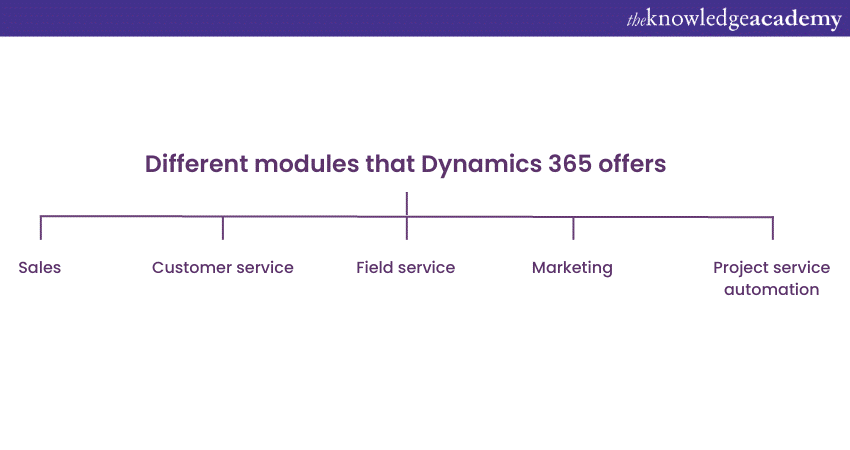We may not have the course you’re looking for. If you enquire or give us a call on 01344203999 and speak to our training experts, we may still be able to help with your training requirements.
Training Outcomes Within Your Budget!
We ensure quality, budget-alignment, and timely delivery by our expert instructors.

Data resources are paramount for any modern-day organisation, irrespective of its size or industry. Many organisations are opting for Enterprise Resource Planning (ERP) and Customer Relationship Management (CRM) to help manage their data better.
While ERP systems consolidate an enterprise's planning, sales and marketing into one system, CRM systems help nurture and maintain healthy customer relationships. One of the platforms that help organisations with both ERP and CRM is Microsoft's Dynamics 365. In this blog, we explain What is Dynamics 365, its different modules and why you should choose the platform for your organisation.
Table of Contents
1) An Introduction to Dynamics 365
2) What are the modules of Dynamics 365 ERP?
3) What are the modules of Dynamics 365 CRM?
4) Why should you choose Dynamics 365?
5) Conclusion
An Introduction to Dynamics 365
Dynamics 365 is a newly introduced, cloud-based enterprise software platform. It bundles Enterprise Resource Planning (ERP), Customer Relationship Management (CRM) and Human Capital Management (HCM) alongside Power BI reporting functions in a streamlined, unified package.
With its ERP and CRM capabilities divided into several applications, the platform is designed so users can start understanding their requirements and develop at their own pace – adding new apps and functionalities per requirements. The solution is based on Azure, Microsoft's cloud-computing technology service hosted in data centres worldwide.
Dynamics 365 is a Software-as-a-Service (SaaS) platform which needs only a web browser to be accessed. This means that not only are any updates or fixes managed by Microsoft and applied automatically, but it is also accessible all the time, even with a basic internet connection. The platform can also be closely integrated with existing Microsoft products, like Office 365 and Outlook, and connect to third-party programs.
Dynamics 365 comprises several applications covering various business processes like customer relationship management, logistics, financial planning and reporting, and more within one program. The common data model sets Dynamics 365 apart from its peers, which enables these apps to share the data. Where data was previously siloed in monolithic suites of applications, the Dynamics 365 apps use and integrate that data. This help users get more out of their data – such as deriving new insights and presenting new opportunities.
What are the modules of Dynamics 365 ERP?
Microsoft Dynamics 365 divides its applications into ERP and CRM solutions. Some of the ERP solutions that organisations can choose from as discussed as follows:
Business Central
The Business Central module of Dynamics 365 is an ERP solution best suited for most small-scale and medium-sized organisations. The solution lets a business start small but eventually helps it scale up and add functionality as the organisational needs grow.
Finance and Operations

The Finance and Operations module of Dynamics 365 covers all the relevant aspects of financial and operational planning and reporting, manufacturing and supply chain management. The Finance and Operations module is an ERP solution best suited for large or diversified companies. This module is especially used by companies with more than one line of business, international operations, multi-currency needs, or complex process manufacturing needs.
However, even though most customers and consultants still call it Finance and Operations, Microsoft now licenses it as two different apps, namely:
a) Dynamics 365 Finance: This module includes budgeting, project management, financial management, and accounting for large, international organisations.
b) Dynamics 365 Supply Chain Management: This module includes functions such as engineering, manufacturing, warehousing, and distribution. The Supply Chain Management module excels at multi-level warehousing and complex and discrete process manufacturing needs. An organisation may choose between the Finance or Supply Chain Management module based on its size and specific needs.
Take your career to the next level with our Microsoft Dynamics 365 Business Central Functional Consultant MB800 Course!
What are the modules of Dynamics 365 CRM?
Organisations can choose from the following Microsoft Dynamics 365 CRM applications and features:
Sales
The Sales module of Dynamics 365 enables users to build, track and monitor relationships with their customers, attain in-depth insight, generate leads and close out sales more quickly and efficiently. This is the most prevalent module offered by Dynamics 365, as it gives a holistic 360-degree view of your interactions with prospects and customers so that your team can plan and forecast your next interactions with them. The Sales module provides a single source of truth for your sales, marketing and account management teams.
Customer Service
The Customer Service module of Dynamics 365 aims to drive an organisation's engagement with customers and helps users deliver fast and personalised service to meet customer expectations. Using the Customer Service module, one can power up their customer service team by tracking customer complaints, returns, warranty claims, SLAs and entitlements efficiently and streamlining how your organisation handles each of these transactions.
Field Service
The Field Service module of Dynamics 365 facilitates users to get the most from their mobile workforce with the help of features such as intelligent scheduling, remote assist monitoring, and contract and inventory management. The Field Service module is suitable for any organisation where your team conducts services offsite (for example, at a customer's preferred location or on your equipment in the field). These licenses also include sales functionality.
Marketing
The Marketing module of Dynamics 365, in association with Adobe Marketing Cloud, combines sales and marketing services to help drive revenue. Using the marketing module, you can strengthen your organisation’s marketing efforts by developing nurture campaigns, calculating lead scores, and providing relevant insights for your next actions to help acquire and retain customers.
Project Service Automation
The Project Service Automation module of Dynamics 365 helps users to manage the product lifecycle from the beginning to the end, including functions for resource management, the handling of contracts and budgeting.
Empower Your Career with Microsoft Power Platform Fundamentals PL-900 Course!
Why should you choose Dynamics 365?
Microsoft Dynamics 365 unifies an organisation's customers and business data, working relationships and workflows – all in a single business cloud. Naturally, it gives organisations plenty of reasons to adopt Dynamics 365 to improve working efficiency and revenue generated. Some of the reasons why organisations choose Dynamics 365 are as follows:
a) Earn customers for life: Organisations tend to go for Dynamics 365 to improve their ERP and CRM because successful platform implementation ensures that the organisations earn a loyal customer base. Applications for sales, marketing and service teams connect everyone to a singular source of information about each relationship, thus empowering everyone to produce consistent service across all channels.
b) Seamless integration with Microsoft apps: A huge reason why many organisations opt for Dynamics 365 is the element of seamless integration that it offers with other existing Microsoft products. One can access Dynamics CRM capabilities across Outlook, Microsoft Teams and other prevalent tools for an unrivalled, connected experience.
c) Modern workflows: Another important reason organisations often opt for Dynamics 365 to help in ERP and CRM is the element of automation that it incorporates into its working processes. The element of automation replaces repetitive manual tasks with connected processes and applies embedded intelligence and triggers to automate routine actions. It also uses the element of automation to consistently reach successful outcomes, from sales to service and other processes.
d) Safeguards data: Another reason organisations opt for Dynamics 365 often is the safety it provides to an organisation's data. With it, your data is safe in the Microsoft Cloud. Cloud products, including Dynamics 365, are built and hosted on Azure secure data centres and are secured by multi-layered protection. With Dynamics 365, an organisation can control user access with role, record and field-based security controls.
e) Actionable insights: Organisations tend to opt for Dynamics 365 for their ERP and CRM because of the tool's actionable insights. With the help of Dynamics 365, an organisation can transition to a data-driven culture and uncover actionable insights with real-time reporting across the relevant metrics that matter to you, using native dashboards and Power BI visualisations.
f) Manage any relationship: Organisations choose Dynamics 365 also because the platform helps an organisation manage all its working relationships. The platform is versatile in managing an organisation's unique working relationships and processes across the set of connected Dynamics 365 modules and other Microsoft apps.
g) Unifies your data: Dynamics 365 also facilitates an organisation to unify all its data. The platform integrates Dynamics 365 modules with other applications, cloud services, and external data sources. These data sources may include accounting databases, marketing automation, CRM systems, websites, etc.
h) Regular updates: Lastly, many organisations opt for the regular updates that Dynamics 365 provides. Microsoft releases two major cloud updates yearly and also provides weekly updates that continuously innovate and extend the capabilities of the applications provided by the platform.
Conclusion
Dynamics 365 is one of the most convenient ERP and CRM tools a modern organisation can use to drive revenue and improve efficiency in the working process. The platform has various tools under the same system, which prompts organisations to opt for it to keep up with their industry competitors. The platform offers several advantages to an organisation, all of which help it get the best out of its data resources. In this blog, we explained What is Dynamics 365, its various modules, and why you must choose the platform.
Empower Your Career with Microsoft Dynamics 365 Finance MB310 Course!
Frequently Asked Questions
Upcoming Microsoft Technical Resources Batches & Dates
Date
 Microsoft Dynamics 365 Fundamentals (CRM) MB910
Microsoft Dynamics 365 Fundamentals (CRM) MB910
Fri 30th Aug 2024
Fri 20th Dec 2024







 Top Rated Course
Top Rated Course



 If you wish to make any changes to your course, please
If you wish to make any changes to your course, please


